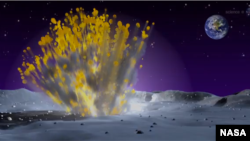The U.S. space agency, NASA, has just spotted the biggest explosion on the Moon in the eight years since the agency has been monitoring lunar impacts caused by meteoroids.
"On March 17, 2013, an object about the size of a small boulder hit the lunar surface in Mare Imbrium," said Bill Cooke of NASA's Meteoroid Environment Office. "It exploded in a flash nearly 10 times as bright as anything we've ever seen before."
The meteoroid, which weighed an estimated 40 kilograms and was just over a third of a meter wide, hit the Moon at a speed of 90,000 kilometers per hour. NASA said it packed the explosive equivalent of five tons of TNT.
Cooke believes the lunar impact might have been part of a much larger event.
"On the night of March 17, NASA and University of Western Ontario all-sky cameras picked up an unusual number of deep-penetrating meteors right here on Earth," he said. "These fireballs were traveling along nearly identical orbits between Earth and the asteroid belt."
The blast on the moon was so bright that anyone looking at Earth’s closest neighbor at the time of impact could have seen the explosion without a telescope.
NASA plans to investigate the impact site with Lunar Reconnaissance Orbiter the next time the spacecraft passes over the site. NASA says the crater could be as wide as 20 meters.
Since the Moon lacks an atmosphere, meteors crash onto the lunar surface with frequency. NASA said more than half of all lunar meteors come from known meteoroid streams such as the Perseid and Leonid meteor showers.
Hundreds of detectable lunar impacts occur every year, NASA said.
Here's a video about the explosion:
"On March 17, 2013, an object about the size of a small boulder hit the lunar surface in Mare Imbrium," said Bill Cooke of NASA's Meteoroid Environment Office. "It exploded in a flash nearly 10 times as bright as anything we've ever seen before."
The meteoroid, which weighed an estimated 40 kilograms and was just over a third of a meter wide, hit the Moon at a speed of 90,000 kilometers per hour. NASA said it packed the explosive equivalent of five tons of TNT.
Cooke believes the lunar impact might have been part of a much larger event.
"On the night of March 17, NASA and University of Western Ontario all-sky cameras picked up an unusual number of deep-penetrating meteors right here on Earth," he said. "These fireballs were traveling along nearly identical orbits between Earth and the asteroid belt."
The blast on the moon was so bright that anyone looking at Earth’s closest neighbor at the time of impact could have seen the explosion without a telescope.
NASA plans to investigate the impact site with Lunar Reconnaissance Orbiter the next time the spacecraft passes over the site. NASA says the crater could be as wide as 20 meters.
Since the Moon lacks an atmosphere, meteors crash onto the lunar surface with frequency. NASA said more than half of all lunar meteors come from known meteoroid streams such as the Perseid and Leonid meteor showers.
Hundreds of detectable lunar impacts occur every year, NASA said.
Here's a video about the explosion:





